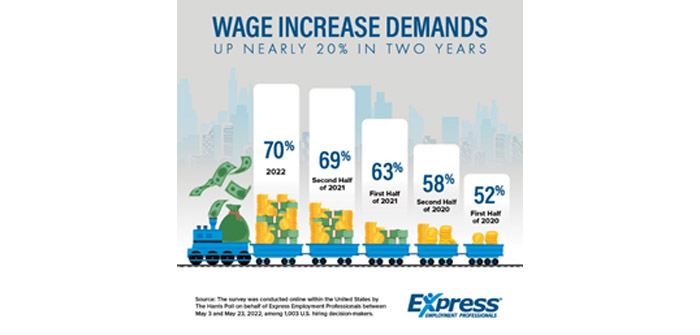Expectations for wage increases have jumped roughly 20 percent since 2020 as 70 percent of companies plan to offer higher salary adjustments through the end of the year. Benefits, however, will gain less ground as only 50 percent of businesses anticipate their offerings to increase compared to 2021.
This is according to a survey from The Harris Poll commissioned by Express Employment Professionals.
Expectations for wage increases have steadily increased over the past two years (52 percent in the first half of 2020, 58 percent in the second half of 2020, 63 percent in the first half of 2021 and 69 percent in the second half of 2021). Yet a fifth of companies (20 percent) feel there will not be a change to their wages for the remainder of 2022.
This comes as a recent nationwide survey from the Federal Reserve Bank of New York’s Center for Microeconomic Data reports the average “reservation wage,” the lowest wage workers would be willing to accept, soared to $73,873 in July.
Benefits Landscape
Currently, more than half of companies (55 percent) offer paid leave, including paid maternity (39 percent), paternity (31 percent) and/or paid parental leave for parents fostering and/or adopting (22 percent). Other benefits offered to employees are flexible work hours (43 percent), flexible work location (34 percent), unpaid parental leave (31 percent) and/or the ability to work part-time (31 percent).
When it comes to these benefits, half of U.S. hiring decision-makers (50 percent) expect these offerings at their company will increase for the remainder of 2022 compared to 2021.
However, around two in five (42 percent) expect their benefits to remain the same. The growth of benefits packages may include offering aspects that were previously not available to employees, such as paid leave and flexible work hours/work sites.
Looking ahead five years, nearly half of hiring managers (48 percent) report their company plans to offer paid leave. Others say flexible work hours (40 percent), flexible work locations (34 percent), part-time work (27 percent), unpaid leave (27 percent) and/or shortened work weeks (24 percent) are also on the table.
“Wages and benefits continue to increase in Central Oregon,” said Chris Petty, franchise manager of the Central Oregon Express franchise office. “While health insurance benefits are important, we are finding that a healthy company culture and paid time off benefits can be the most important offering for recruiting and retention.”
Finding the right balance between wage offerings and spending limitations is one of the biggest challenges employers are facing right now, according to Express Employment International CEO Bill Stoller.
“So many businesses are stretched thin between salary demands, inflation and supply chain blockades,” he added. “The next several months will be pivotal to companies to see if they can survive the high cost of success.”
Survey Methodology
The survey was conducted online within the United States by The Harris Poll on behalf of Express Employment Professionals between May 3 and May 23, 2022, among 1,003 U.S. hiring decision-makers (defined as adults ages 18+ in the U.S. who are employed full-time or self-employed, work at companies with more than one employee, and have full/significant involvement in hiring decisions at their company). Data were weighted where necessary by company size to bring them into line with their actual proportions in the population.
expresspros.com • 541-389-1505




